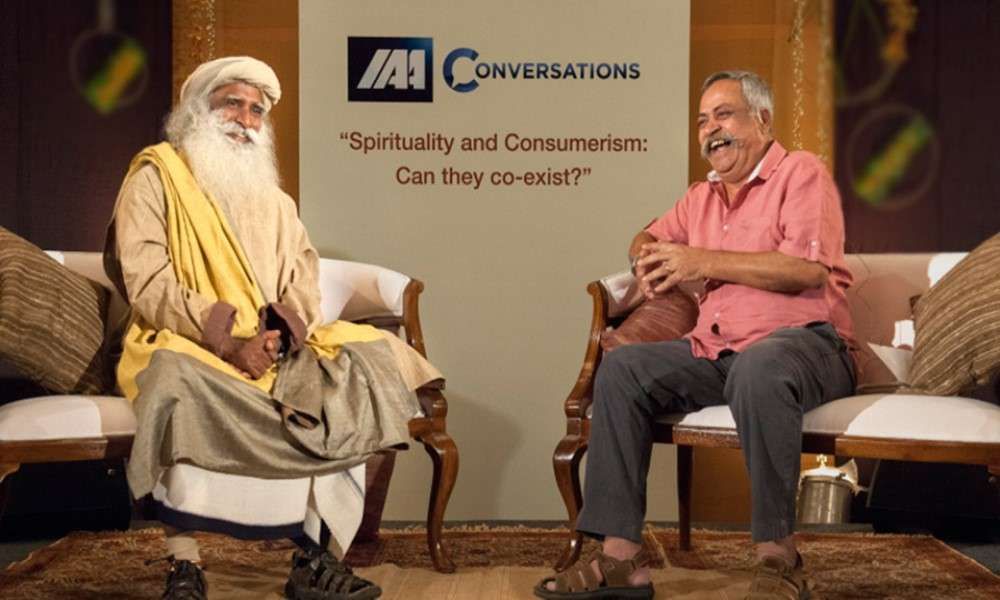Conscious Consumption – Moving Towards A Sensible Mode of Life
“Ad man” Piyush Pandey seeks yogi and mystic, Sadhguru’s, inputs on moving from mindless to conscious consumption, as they explore the psychology of consumerism.

“Ad man” Piyush Pandey, Executive Chairman and Creative Director at Ogilvy & Mather India, seeks yogi and mystic, Sadhguru’s, inputs on moving from mindless to conscious consumption, as they explore the psychology of consumerism.
Piyush: The first thing that I want to ask you – is consumerism actually driven by paranoia? People buy six saris because they are afraid that when they go to a party, someone else there is wearing the same sari. People buy a new mobile phone every three months because someone else also got a new mobile phone. When it comes to children’s products, I think the paranoia is at a phenomenal level.
When I was young, no one stopped me from climbing trees, no one gave me extra supplements with my food, and people allowed me to do things that I wanted to do. Today, we are feeding our children all kinds of things, which is paranoia to me. Is consumerism driven by paranoia?
Sadhguru: Whether it is consumerism or something else – any kind of “ism” will lead to a certain mindlessness. Mindless consumerism is definitely not towards human wellbeing. Consumption (Archaic name for pulmonary tuberculosis) used to be a disease, you know? Even now, it is a kind of ailment. That is, we do not do what is needed in our lives – we do what is expected by others. People who expect whatever they expect out of you, they themselves do not know a thing about their lives. If you live to fulfil their expectations, obviously, your life will go off the track. So, I feel the advertising industry should focus on creating conscious consumption rather than mindless consumerism.
Subscribe
Mindlessness means just simply doing something. Once mindlessness sets in, society will go in cycles, not really getting anywhere. There will be nothing profound in that society. Everything will become profane. Right now, we are rapidly going in that direction. India used to be a culture where every aspect of life had a deeper rooting and meaning. Even simple things – how to sit, how to stand, how to eat – always had a deeper connotation. Because of this, no matter what kind of rigors the outside situations offered us in the form of invasions, famines, or whatever came, the spirit of India lived on undisturbed.
If you take away this deeper rooting in human beings and make them live out of a mall, they will get shattered easily. Until about 20 years ago, the number of people who were psychologically deranged in this country was extremely low. You could say the number is low because proper records were not kept, which is a fact, but still, for so many hundreds of millions of people, the number of those who were psychologically deranged was extremely small because of this deeper rooting, that every simple thing had a deeper meaning and a deeper possibility. If you look at the percentage of the U.S. population who are on antidepressants, that is not a healthy society, which in many ways is a result of mindless consumerism.
From mindless to conscious consumption
It is very important that human societies function out of their intelligence, not just out of external tendencies, which come and go. Pushing the majority of society into that kind of a mode clearly shows we are not interested in the wellbeing of human beings – we just want to sell something at any cost. And above all, if the over 7 billion people on the planet consume at the same level as an average American citizen, statistics say, we will need almost four-and-a-half planets. But we only have half a planet left. This means you have to keep half of the world population in abject poverty so that others can go on a consumerism binge.
I think a more sensible way of living is possible. This does not mean you should not enjoy your life, or that you should not have things. Everyone should have what they need. But digging up the planet just for the sake of satisfying someone else’s opinion is simply mindless. I am not trying to render an ecological message. My concern is about human beings. This is like the proverbial story of a man cutting the branch that he is sitting on. If he succeeds, he will fall. In many ways, this is already happening. Nowadays you see that many of the most successful people have really tense and agitated faces. This does not mean success is suffering. It is mindless consumerism that leads to suffering. So I feel the ad industry should focus on conscious consumption.
Editor’s Note: Get the latest updates from the Isha Blog. Twitter, facebook, rss or browser extensions, take your pick.
This article is based on an excerpt from the March 2014 issue of Forest Flower, available as “pay what you want.” (set ‘0’ in price field for free). Print subscriptions are also available.





